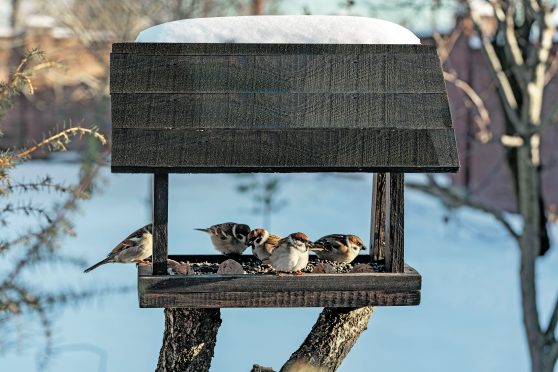
For millions of us, it’s just an innocent act of kindness – but feeding the birds in your garden could be killing off wildlife, according to experts.
Researchers claim industrial fertiliser from the 150,000 tons of seed we leave out every year is leaching into the environment, putting at risk fish, insects and riverbank mammals, such as otters and voles.
A new study by Exeter University warns that excess phosphorus is creating pollution hot spots, especially in Central Scotland, turning thriving waterways into poisonous dead zones.
And the damage is not just from gardens but also where game birds are reared ahead of the shooting season, which began last week on The Glorious 12th.
Bird feed impacts
The report, published in the journal Frontiers In Ecology And The Environment, concludes: “It is important to consider the fate of nutrients from bird feed, as supply – already a multi-billion-dollar industry – is increasing over time. New products for feeding garden birds are being marketed to consumers at an exponential rate.
“We believe bird-feeding may have unconsidered repercussions for broader ecosystem dynamics.
“We support advice to invoke the ‘precautionary principle’ and reconsider and reduce regular bird feeding.”
However, the Scottish Wildlife Trust have countered the claim, citing population increases for bird species such as the gold finch.
It said: “Feeding garden birds helps people develop a connection to the natural world, which is good for their health and well-being.
“Introducing any chemical into an ecosystem may have impacts on the surrounding environment.
“However, any negative impacts must be weighed against the benefits of providing birds with a safe, reliable food source.
“Evidence suggests feeding birds has led to population increases for species such as goldfinch and long-tailed tit, and the variety of species recorded in gardens has increased too.
“While our current position is that there is a net-positive for wildlife, we would welcome and support further study into this subject.”
An estimated 58% of Britons with gardens spend £345 million a year leaving out food for the birds – typically imported nuts, millet, sunflower seeds and soy.
Meanwhile, shooting estates feed 43 million pheasants and partridges with nearly 400,000 tons of pellets made from wheat, barley and corn. But nearly all the seed has been grown using industrial fertiliser containing phosphorus mined abroad.
The mineral then ends up in the droppings of birds and animals that eat the seed, often concentrating in waterways.
It fuels eutrophication, a process that robs fresh water of oxygen, turning it stagnant and lifeless.
Ecologists warn that the process can dismantle an entire food chain from mayflies to wild salmon and eels; curlews and dippers to otters and water voles. The latest study – a collaboration with the universities of Aarhus in Denmark and Northern Arizona and Cornell in the US – estimates that bird seed adds 2,400 tons of phosphorus to the UK environment each year.
And it’s a relatively significant problem in the heavily-populated Central Belt, though less so in the Highlands.
Phosphorus levels
The authors claim that robins, blackbirds and blue tits probably leave enough phosphorus on public parks and residential gardens to keep flower beds fertilised on their own.
But they add: “Where phosphorus input from bird feeding is substantial, effects on semi-natural ecosystems in the UK may be profound.
“Excess phosphorus is eventually exported into freshwater systems, which can cause eutrophication.
“Nationally, the phosphorus flux into rivers is dominated by agricultural run-off and sewage effluent. However, there may be sites where phosphorus pollution from supplementary bird feed is important such as headwater streams in areas where game-bird feeding is high.
“Ultimately, phosphorus derived from supplementary bird feed will eventually enter nearshore marine ecosystems, with potentially harmful effects.
“The case study of the UK should serve as a cautionary example.
“Yet feeding garden birds is widely supported by many organisations and government agencies, while supplementary feeding of game birds is promoted by gamekeeper organisations.”
Small changes
The British Trust for Ornithology called for a review of what is fed to game birds and farmed poultry – but insists the public can make small changes too. Spokesman Jon Carter said: “Cheaper bird feed will often be produced less ethically. By sourcing UK-grown food, from companies that are known to reduce impacts through environmentally responsible farming, we can minimise these negatives.
“We can manage our gardens to be more wildlife-friendly by planting fruit and seed-bearing plants, installing a pond and leaving wild areas. As alternatives, seeded brown bread can be OK in small quantities, as can dried fruit and oats.”
A spokesman for the Scottish Gamekeepers Association said: “You are not going to stop people feeding birds in their garden. Similarly, supplementary feeding on shoots is scientifically-proven to help many small farmland birds through the ‘hungry gap’.
“We wouldn’t want to lose those benefits but if things can be done better, they should be looked at.”

Enjoy the convenience of having The Sunday Post delivered as a digital ePaper straight to your smartphone, tablet or computer.
Subscribe for only £5.49 a month and enjoy all the benefits of the printed paper as a digital replica.
Subscribe